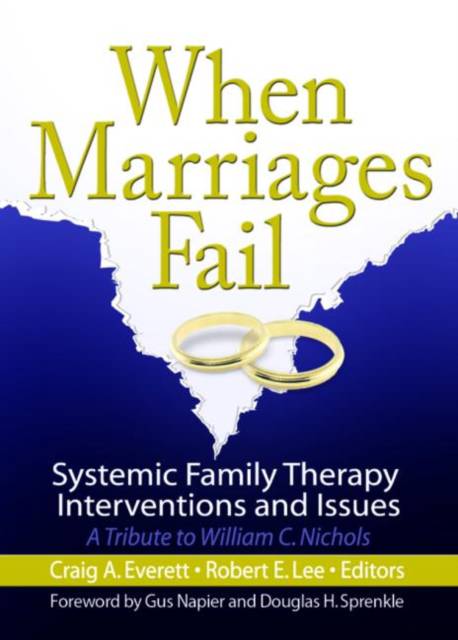
- Retrait gratuit dans votre magasin Club
- 7.000.000 titres dans notre catalogue
- Payer en toute sécurité
- Toujours un magasin près de chez vous
- Retrait gratuit dans votre magasin Club
- 7.000.000 titres dans notre catalogue
- Payer en toute sécurité
- Toujours un magasin près de chez vous
When Marriages Fail
Systemic Family Therapy Interventions and Issues
Craig Everett, Robert E Lee
Livre broché | Anglais
58,45 €
+ 116 points
Format
Description
Leading experts reveal systemic and integrative approaches to family therapy
When Marriages Fail: Systemic Family Therapy Interventions and Issues presents several leading experts in the field discussing the full spectrum of clinical interventions and family therapy for troubled and divorcing families. This comprehensive resource presents a broad overview of the literature that provides a foundation for the entire field, then narrows its focus to clearly review clinical assessment models and the special issues that may be factors in conflicted families. Therapists, psychologists, counselors, and social workers learn cutting-edge recommendations for policies protecting the well-being of children involved in divorce, plus practical, specific systemic treatment interventions that are illustrated with case studies. When Marriages Fail is separated into three logically organized sections. Part one provides a helpful overview of the field's evolving literature as it stands now and gives tools to therapists and their clients to explore their internal and dyadic processes in considering whether or not to divorce. The second part presents two systemic models that explore the dynamics of conflicted couples moving toward divorce and considers specific family circumstances that affect the entire divorce process, such as family violence, disclosure of gender orientation, and the unhappiness of the family's children. Part three discusses in detail specific and practical treatment interventions, considering factors involved when diverse families separate, divorce, and remarry. The text also provides a fitting tribute to William C. Nichols, a pioneer of marital and family therapy. Topics in When Marriages Fail include:- the therapist's choices in helping couples process their own choices
- an ecosystemic look at the rights of children in divorce
- interventions for mourning, adulterous triangles, incongruent goals, cultural differences, or family of origin
- disclosing gay or lesbian orientation in marriage
- domestic violence issues
- children's trauma in the parental break-up
- family therapy interventions through three systemic stages of divorce
- remarriage of the first spouse in post-divorce families
- trauma of the betrayed spouse
- parent loss and serial relationships
- gay divorces
- and more!
With Forewords by Douglas Sprenkle and Augustus Y. Napier as well as several international contributors who shed light on how this compelling subject is addressed outside of the United States, When Marriages Fail is an invaluable source of the latest knowledge and interventions for family therapists, counselors, social workers, and psychologists.
Spécifications
Parties prenantes
- Auteur(s) :
- Editeur:
Contenu
- Nombre de pages :
- 346
- Langue:
- Anglais
Caractéristiques
- EAN:
- 9780789028631
- Date de parution :
- 01-01-07
- Format:
- Livre broché
- Format numérique:
- Trade paperback (VS)
- Dimensions :
- 155 mm x 212 mm
- Poids :
- 530 g







